Универсальная энциклопедическая платформа работы со знанием
Аннотация
Стремительная экспансия цифрового пространства, охватывающая всю жизнь современного общества, сопровождается взрывным ростом информационных потоков. Этот процесс особенно затрагивает образовательную среду, для которой обмен информацией является принципом существования. Платформа, рассматриваемая в статье, позволяет унифицировать форматы создаваемой и хранимой информации, обеспечивая создание единой многоуровневой цифровой образовательной среды. На этой платформе строится информационная система "Ковчег знаний МГУ", представляющий собой научную онлайн-библиотеку, содержащую лекции, учебники, научные статьи и сетевую энциклопедию по различным областям знаний, а также хранилище мультимедийных данных. Материалы Ковчега, формируемые университетским экспертным сообществом, являются важным источником информации для создания энциклопедических статей на портале "Большая российская энциклопедия".
Литература
2. Semenov A.L. Artificial Intelligence in Society. DokladyMathematics. 2023;108(2):S168-S178. https://doi.org/10.1134/S106456242355001X
3. McCarthy A.M., Maor D., McConney A. Cavanaugh C. Digital transformation in education: Critical components for leaders of system change. Social Sciences & Humanities Open. 2023;8(1):100479. https://doi.org/10.1016/j.ssaho.2023.100479
4. Oliveira K.K.S., Souza R.A.C. Digital Transformation towards Education 4.0. Informatics in Education. 2022;21(2):283-309. https://doi.org/10.15388/infedu.2022.13
5. Plekhanov D., Franke H., Netland T.H. Digital transformation: A review and research agenda. European Management Journal. 2023;41(6):821-844. https://doi.org/10.1016/j.emj.2022.09.007
6. Semenov A.L., Ziskin K.E. Expanded Personality as the Main Entity and Subject of Philosophical Analysis: Implications for Education. DokladyMathematics. 2023;108(4):331-341. https://doi.org/10.1134/S1064562423700965
7. Asmolov A., Guseltseva M. Education As A Space Of Opportunities: From Human Capital To Human Potential. In: Martsinkovskaya T., Orestova V.R. (Eds.) Psychology of Subculture: Phenomenology and Contemporary Tendencies of Development. Vol. 64. European Proceedings of Social and Behavioural Sciences. Future Academy; 2019. p. 40-45. https://doi.org/10.15405/epsbs.2019.07.6
8. Kleinke S. Wikipedia: quotations at the interface of encyclopedic and participatory practices. Journal of Pragmatics. 2020;157:119-130. https://doi.org/10.1016/j.pragma.2019.07.011
9. Piccardi T., West R., Redi M., Colavizza G. Quantifying Engagement with Citations on Wikipedia. (Part 1). Scientific and Technical Libraries. 2020;(9):95-120. (In Russ., abstract in Eng.) https://doi.org/10.33186/1027-3689-2020-9-95-108
10. Piccardi T., West R., Redi M., Colavizza G. Quantifying Engagement with Citations on Wikipedia. (Part 2) (The translation and original text of the article are presented). Scientific and Technical Libraries. 2020;(10):63-86. https://doi.org/10.33186/1027-3689-2020-10-63-76
11. Piccardi T., West R., Redi M., Colavizza G. Quantifying Engagement with Citations on Wikipedia. (Part 3). Scientific and Technical Libraries. 2020;(11):147-164. EDN: QSMNKJ
12. Shenoy K., Ilievski F., Garijo D., Schwabe D., Szekely P. A study of the quality of Wikidata. Journal of Web Semantics. 2022;72:100679. https://doi.org/10.1016/j.websem.2021.100679
13. Hussain M.J., Wasti S.H., Huang G., Wei L., Jiang Y., Tang Y. An approach for measuring semantic similarity between Wikipedia concepts using multiple inheritances. Information Processing & Management. 2020;57(3):102188. https://doi.org/10.1016/j.ipm.2019.102188
14. Mostafa M.M. Twenty years of Wikipedia in scholarly publications: a bibliometric network analysis of the thematic and citation landscape. Quality & Quantity. 2023;57(6):5623-5653. https://doi.org/10.1007/s11135-023-01626-7
15. Gulyaev A.V., Bubnov A.S., Raevsky E.N. MediaWiki as a Tool for Creating a Digital University Model. Modern Information Technologies and IT-Education. 2021;17(1):200-207. (In Russ., abstract in Eng.) https://doi.org/https://doi.org/10.25559/SITITO.17.202101.736
16. Abdulameer A.S., Tiun S., Sani N.S. Ayob M., Taha A.Y. Enhanced clustering models with wiki-based k-nearest neighbors-based representation for web search result clustering. Journal of King Saud University Computer and Information Sciences. 2022;34(3):840-850. https://doi.org/10.1016/j.jksuci.2020.02.003
17. Rogushina Ju. Processing of Wiki Resource Semantics on Base of Ontological Analysis. In: Golenkov V., et al. (eds.) Open Semantic Technologies for Intelligent Systems. OSTIS 2018. Vol. 8. Minsk: BSUIR; 2018. p. 159-162. EDN: YUCSAO
18. Chen P., Song J., Zhao M., Song L. Building Discipline Knowledge Repository Based on Wiki Technology. In: 2018 9th International Conference on Information Technology in Medicine and Education (ITME). Hangzhou, China: IEEE Computer Society; 2018. p. 407-410. https://doi.org/10.1109/ITME.2018.00097
19. Petrucco C., Ferranti . Wikipedia as OER: the "Learning with Wikipedia" project. Journal of E-Learning and Knowledge Society. 2020;16(4):38-45. https://doi.org/10.20368/1971-8829/1135322
20. Goryachko V.V., Bubnov A.S., Raevskij E.V., Semenov A.L. Digital Ark of Knowledge. Doklady Mathematics. 2022;106(1):S113-S117. https://doi.org/10.1134/S1064562422060096
21. Semenov A., Soprunov S., Uspensky V. The Lattice of Definability. Origins, Recent Developments, and Further Directions. In: Hirsch E.A., Kuznetsov S.O., Pin J.É., Vereshchagin N.K. (eds) Computer Science Theory and Applications. CSR 2014. Lecture Notes in Computer Science. Vol. 8476. Cham: Springer; 2014. p. 23-38. https://doi.org/10.1007/978-3-319-06686-8_3
22. Oleynik A.G., Lomov P.A. Development of the ontology of integrated knowledge space. Ontology of designing. 2016;6(4):465-474. (In Russ., abstract in Eng.) https://doi.org/10.18287/2223-9537-2016-6-4-465-474
23. Ponkin I.V. Ontologies as a Toolkit for Practical Analytics. International Journal of Open Information Technologies. 2023;11(2):77-84. (In Russ., abstract in Eng.) EDN: WMOTBT
24. Guarino N., Oberle D., Staab S. What Is an Ontology? In: Staab S., Studer R. (eds.) Handbook on Ontologies. International Handbooks on Information Systems. Berlin, Heidelberg: Springer; 2009. p. 1-17. https://doi.org/10.1007/978-3-540-92673-3_0
25. Teixeira M.S., Welt M., Chis R., Glimm B. Challenges on Deriving Planning Problems from Ontologies. CEUR Workshop Proceedings. 2023;3493:1-6. Available at: https://ceur-ws.org/Vol-3493/short-paper-1.pdf (accessed 12.07.2023).

Это произведение доступно по лицензии Creative Commons «Attribution» («Атрибуция») 4.0 Всемирная.
Редакционная политика журнала основывается на традиционных этических принципах российской научной периодики и строится с учетом этических норм работы редакторов и издателей, закрепленных в Кодексе поведения и руководящих принципах наилучшей практики для редактора журнала (Code of Conduct and Best Practice Guidelines for Journal Editors) и Кодексе поведения для издателя журнала (Code of Conduct for Journal Publishers), разработанных Комитетом по публикационной этике - Committee on Publication Ethics (COPE). В процессе издательской деятельности редколлегия журнала руководствуется международными правилами охраны авторского права, нормами действующего законодательства РФ, международными издательскими стандартами и обязательной ссылке на первоисточник.
Журнал позволяет авторам сохранять авторское право без ограничений. Журнал позволяет авторам сохранить права на публикацию без ограничений.
Издательская политика в области авторского права и архивирования определяются «зеленым цветом» в базе данных SHERPA/RoMEO.
Все статьи распространяются на условиях лицензии Creative Commons «Attribution» («Атрибуция») 4.0 Всемирная, которая позволяет другим использовать, распространять, дополнять эту работу с обязательной ссылкой на оригинальную работу и публикацию в этом журналe.













